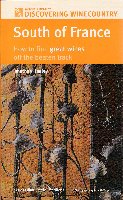
Peter-Danton de Rouffignac meets an Englishman
who became a wine expert in France
Of all the careers to choose, becoming a wine expert is probably not the easiest, especially when you are English and newly arrived in France. But that’s exactly what editor, author and acknowledged wine expert Jonathan Healey has managed to do in his region of Languedoc-Roussillon. He is the first person to write a guide, in English, to the wines of Roussillon and has carved a niche for himself advising local vignerons on how to market their wines to the English world. His latest venture is to set up his own wine club, which will enable members to help to cultivate – and drink – their own organic wines.
“It’s not exactly what I planned when I moved to the region seven years ago,” admits Jonathan, a forty-something who looks half his age. “I had been on holiday here a few times with my parents and knew the region well. The local wines had suffered from a poor reputation and over-production, but I set out to study them and was surprised by what I discovered”.
By chance Yorkshire-born Jonathan had spent his teens and early twenties in California, where he had gone originally with the idea of taking a short holiday. He ended up completing his studies at a local community college, and went on to complete a BA and MA at the University of California-Davis.
“UC-Davis happens to be the foremost wine school on the West Coast of America and I started taking a few courses as part of my degree. I also worked for a local wine maker and learnt a lot about the New World approach to wine making,” Jonathan explains. In between studying and working, Jonathan was also editing the university’s daily newspaper and presenting local television programmes. It was a full life. He was on his way to completing his doctorate when a tragic motorcyle accident cut short his university career and he had to return to England. “It was a tough time for me,” he admits, “but I got into university teaching, and I thought that’s where my career would progress”.
However, increasingly fed up with London and the academic life, Jonathan decided to abandon his teaching career and settle in Languedoc-Roussillon. “I had no clear ideas about how I would earn a living,” he says, “though a business partner and I had some ideas about developing tourism in the area, part of which included running cultural and wine tours. By chance this got me into contact with a local publisher and very soon I was writing my first wine book. The publishers very bravely decided to take on the first book in English about the region’s wines. And in the course of my researches I met a number of exciting, often young vignerons, who were producing some distinctive wines, more than a dozen of which have AOC classification”.
Not quite sure how to take this new English expert, the local producers gradually warmed to Jonathan’s enthusiasm. Gradually a business was built up helping to translate brochures – and increasingly websites – into understandable English (“some of it was appalling” Jonathan notes), advising on PR and marketing, and introducing the idea of wine-based tourism to encourage visitors to visit local vineyards and try the wines out for themselves.
As a vegetarian and keen on personal fitness – Jonathan cycles, swims and scuba dives – Jonathan was naturally attracted to a small but growing number of local wine producers who were in the process of switching to organic production.
“Progress is relatively slow in France overall” Jonathan explains, “probably accounting for less than 2 per cent of total wine production. I was fascinated by the total contrast to California, where production is often highly mechanised, and dependant on chemical fertilisers and sometimes genetically modified grapes. It is the antithesis of everything I believe in about how wine can and should be made”.
Not surprisingly to launch his wine club Jonathan has turned to a local producer, now in his third year of going organic and about to receive formal certification. “We have insisted on a total ban on chemical fertilisers and plouging the vines will be done by horses and harvesting entirely by hand. We have designed the club in such a way that members can participate in the main production events over a period of twelve months, including tasks such as pruning and training the vines, to the more exciting harvesting, fermenting, bottling and tasting.
“The club year will run from March to the following February, and members will be able to join in as many events as they wish. I already have a group of friends who are fulltimes residents in the region who want to join, while others may wish to come down only during holiday times,” Jonathan explains.
Always willing to pass on his expertise, Jonathan emphasises that club members will benefit from practical guidance by local producers and ‘classroom’ sessions to supplement their knowledge. The club is based in an ancient Roussillon mas which was formerly the site of a fortified castle occupied by the Knights Templar. “Members have the chance to learn a bit of local history as well as organic wine-making” says Jonathan. “What nicer way to spend a few days in the Roussillon sunshine?”.
First published in French Property News (June, 2009)
















